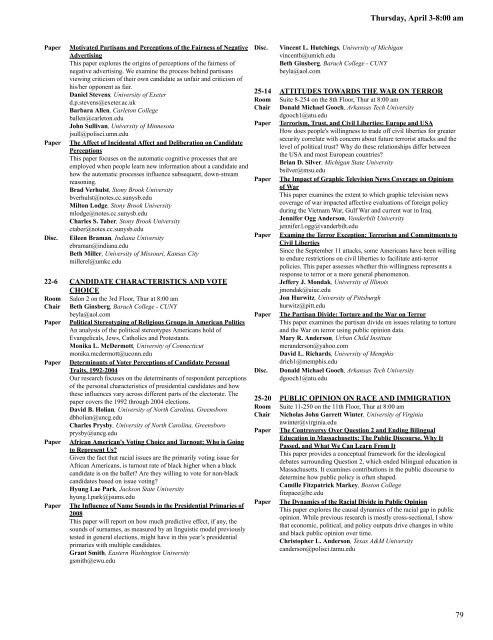2008 Conference Program - Midwest Political Science Association
2008 Conference Program - Midwest Political Science Association
2008 Conference Program - Midwest Political Science Association
Create successful ePaper yourself
Turn your PDF publications into a flip-book with our unique Google optimized e-Paper software.
Thursday, April 3-8:00 am<br />
Paper<br />
Paper<br />
Disc.<br />
Motivated Partisans and Perceptions of the Fairness of Negative<br />
Advertising<br />
This paper explores the origins of perceptions of the fairness of<br />
negative advertising. We examine the process behind partisans<br />
viewing criticism of their own candidate as unfair and criticism of<br />
his/her opponent as fair.<br />
Daniel Stevens, University of Exeter<br />
d.p.stevens@exeter.ac.uk<br />
Barbara Allen, Carleton College<br />
ballen@carleton.edu<br />
John Sullivan, University of Minnesota<br />
jsull@polisci.umn.edu<br />
The Affect of Incidental Affect and Deliberation on Candidate<br />
Perceptions<br />
This paper focuses on the automatic cognitive processes that are<br />
employed when people learn new information about a candidate and<br />
how the automatic processes influence subsequent, down-stream<br />
reasoning.<br />
Brad Verhulst, Stony Brook University<br />
bverhulst@notes.cc.sunysb.edu<br />
Milton Lodge, Stony Brook University<br />
mlodge@notes.cc.sunysb.edu<br />
Charles S. Taber, Stony Brook University<br />
ctaber@notes.cc.sunysb.edu<br />
Eileen Braman, Indiana University<br />
ebraman@indiana.edu<br />
Beth Miller, University of Missouri, Kansas City<br />
millerel@umkc.edu<br />
22-6 CANDIDATE CHARACTERISTICS AND VOTE<br />
CHOICE<br />
Room Salon 2 on the 3rd Floor, Thur at 8:00 am<br />
Chair Beth Ginsberg, Baruch College - CUNY<br />
beyla@aol.com<br />
Paper <strong>Political</strong> Stereotyping of Religious Groups in American Politics<br />
An analysis of the political stereotypes Americans hold of<br />
Evangelicals, Jews, Catholics and Protestants.<br />
Monika L. McDermott, University of Connecticut<br />
monika.mcdermott@uconn.edu<br />
Paper Determinants of Voter Perceptions of Candidate Personal<br />
Traits, 1992-2004<br />
Our research focuses on the determinants of respondent perceptions<br />
of the personal characteristics of presidential candidates and how<br />
these influences vary across different parts of the electorate. The<br />
paper covers the 1992 through 2004 elections.<br />
David B. Holian, University of North Carolina, Greensboro<br />
dbholian@uncg.edu<br />
Charles Prysby, University of North Carolina, Greensboro<br />
prysby@uncg.edu<br />
Paper African American's Voting Choice and Turnout: Who is Going<br />
to Represent Us<br />
Given the fact that racial issues are the primarily voting issue for<br />
African Americans, is turnout rate of black higher when a black<br />
candidate is on the ballet Are they willing to vote for non-black<br />
candidates based on issue voting<br />
Hyung Lae Park, Jackson State University<br />
hyung.l.park@jsums.edu<br />
Paper The Influence of Name Sounds in the Presidential Primaries of<br />
<strong>2008</strong><br />
This paper will report on how much predictive effect, if any, the<br />
sounds of surnames, as measured by an linguistic model previously<br />
tested in general elections, might have in this year’s presidential<br />
primaries with multiple candidates.<br />
Grant Smith, Eastern Washington University<br />
gsmith@ewu.edu<br />
Disc.<br />
Vincent L. Hutchings, University of Michigan<br />
vincenth@umich.edu<br />
Beth Ginsberg, Baruch College - CUNY<br />
beyla@aol.com<br />
25-14 ATTITUDES TOWARDS THE WAR ON TERROR<br />
Room Suite 8-254 on the 8th Floor, Thur at 8:00 am<br />
Chair Donald Michael Gooch, Arkansas Tech University<br />
dgooch1@atu.edu<br />
Paper Terrorism, Trust, and Civil Liberties: Europe and USA<br />
How does people's willingness to trade off civil liberties for greater<br />
security correlate with concern about future terrorist attacks and the<br />
level of political trust Why do these relationships differ between<br />
the USA and most European countries<br />
Brian D. Silver, Michigan State University<br />
bsilver@msu.edu<br />
Paper The Impact of Graphic Television News Coverage on Opinions<br />
of War<br />
This paper examines the extent to which graphic television news<br />
coverage of war impacted affective evaluations of foreign policy<br />
during the Vietnam War, Gulf War and current war in Iraq.<br />
Jennifer Ogg Anderson, Vanderbilt University<br />
jennifer.l.ogg@vanderbilt.edu<br />
Paper Examing the Terror Exception: Terrorism and Commitments to<br />
Civil Liberties<br />
Since the September 11 attacks, some Americans have been willing<br />
to endure restrictions on civil liberties to facilitate anti-terror<br />
policies. This paper assesses whether this willingness represents a<br />
response to terror or a more general phenomenon.<br />
Jeffery J. Mondak, University of Illinois<br />
jmondak@uiuc.edu<br />
Jon Hurwitz, University of Pittsburgh<br />
hurwitz@pitt.edu<br />
Paper The Partisan Divide: Torture and the War on Terror<br />
This paper examines the partisan divide on issues relating to torture<br />
and the War on terror using public opinion data.<br />
Mary R. Anderson, Urban Child Institute<br />
mcranderson@yahoo.com<br />
David L. Richards, University of Memphis<br />
drich1@memphis.edu<br />
Disc. Donald Michael Gooch, Arkansas Tech University<br />
dgooch1@atu.edu<br />
25-20 PUBLIC OPINION ON RACE AND IMMIGRATION<br />
Room Suite 11-250 on the 11th Floor, Thur at 8:00 am<br />
Chair Nicholas John Garrett Winter, University of Virginia<br />
nwinter@virginia.edu<br />
Paper The Controversy Over Question 2 and Ending Bilingual<br />
Education in Massachusetts: The Public Discourse, Why It<br />
Passed, and What We Can Learn From It<br />
This paper provides a conceptual framework for the ideological<br />
debates surrounding Question 2, which ended bilingual education in<br />
Massachusetts. It examines contributions in the public discourse to<br />
determine how public policy is often shaped.<br />
Camille Fitzpatrick Markey, Boston College<br />
fitzpace@bc.edu<br />
Paper The Dynamics of the Racial Divide in Public Opinion<br />
This paper explores the causal dynamics of the racial gap in public<br />
opinion. While previous research is mostly cross-sectional, I show<br />
that economic, political, and policy outputs drive changes in white<br />
and black public opinion over time.<br />
Christopher L. Anderson, Texas A&M University<br />
canderson@polisci.tamu.edu<br />
79










